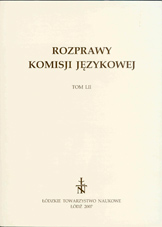Dwie warstwy chronologiczne leksyki z pola tematycznego „praca” w języku mieszkańców wsi wielkopolskiej
Two chronological layers of lexis in the semantic field „work” in the language of village inhabitants of the Wielkopolska Region (Great Poland)
Author(s): Justyna KobusSubject(s): Language and Literature Studies
Published by: Łódzkie Towarzystwo Naukowe
Summary/Abstract: In the language of village inhabitants of Great Poland one can distinguish two chronological layers of vocabulary in the semantic field “work” – the layer of the old vocabulary and the layer of the contemporary vocabulary. Between them oscillates a transitional layer. The vocabulary classified as contemporary constitutes the lexicon, which is actively used by the residents of villages in which the studies were conducted, and the frequency of use of this lexical inventory is much higher than of the old vocabulary. Words considered as old can be used in an active or passive way depending on the generational position of a respondent. In the set of the old (obsolete) vocabulary more synonymic relationships can be observed than in the contemporary vocabulary.
Journal: Rozprawy Komisji Językowej
- Issue Year: 2007
- Issue No: 52
- Page Range: 73-82
- Page Count: 10
- Language: Polish

